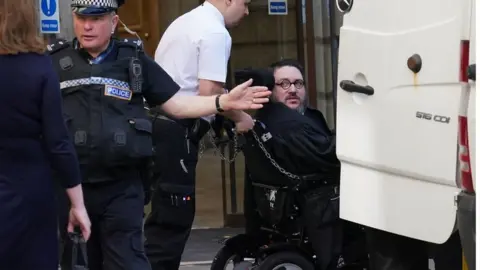Nicholas Rossi's mental health 'should not stop extradition' - expert
 PA Media
PA MediaA psychiatrist has told a court hearing that rape suspect Nicholas Rossi's mental state is unlikely to be a barrier to his extradition.
US prosecutors want to extradite Mr Rossi - who claims to be a man called Arthur Knight - to face charges in Utah.
Dr Kunal Choudhary told Edinburgh Sheriff Court he assessed Mr Rossi by videolink in May.
That interview did not suggest he had an acute mental illness, he said.
The doctor said the man's symptoms pointed to a personality disorder, but that confirming a diagnosis would require multiple assessments.
Dr Choudhary said that "even if a personality disorder was present, it's unlikely to present a barrier to his extradition".
Mr Rossi was arrested and detained, while he was being treated for Covid-19 at the Queen Elizabeth University Hospital in Glasgow, in December 2021, in connection with an alleged rape in Utah.
It was alleged that Mr Rossi faked his own death in 2020 and fled from the US to the UK to evade prosecution.
Mr Rossi appeared at court more than four hours late due to transport issues from HMP Edinburgh where he is being held on remand.
For a second day he was wearing what appeared to be a black legal gown. But when quizzed about his appearance by Sheriff Norman McFadyen, his defence lawyer Mungo Bovey KC said Mr Rossi was wearing a bekishe, a type of frock coat worn by Orthodox Jewish men.
Mr Rossi has told of how he converted to Judaism while on remand in prison.
Dr Choudhary said Mr Rossi presented as "pleasant and engaging" throughout his assessment but could, at times, be tearful, particularly when talking about being away from his wife, Miranda.
The psychiatrist also said that Rossi could undergo treatment in the US and it was unlikely that staying in the UK for treatment would benefit him.
He also said that Mr Rossi was unable to give him a full picture about his early life, education or work history.
Earlier on Tuesday, Sheriff McFadyen ruled the hearing could not be discharged.
Mr Rossi's team made a submission that he was not brought before a sheriff in the appropriate timeframe and claimed he did not receive an important National Crime Agency document alongside the Interpol red notice he was served.
The hearing continues.
